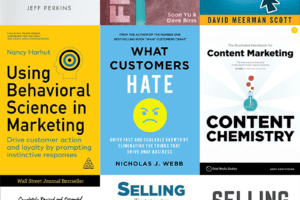Episode 38 of The Verblio Show
What makes a neuroscientist decide to become a category-creating entrepreneur?
For Mark Organ, it’s the desire to make a move after two data points, and not to spend a year replicating experiments to prove an answer he knew on day one.
“My belief is that you should make a decision when you’ve got 70% of the data,” he says, and that approach has worked remarkably well for him so far. On Episode 38, Mark breaks down the rest of the process that led him to create not one but two new categories of marketing software as founder and CEO of Eloqua and Influitive. He also shares the playbook he uses as CEO of Categorynauts to help other entrepreneurs do the same.
Guest-at-a-Glance
Name: Mark Organ
What he does: Executive coach and CEO of Categorynauts. Former founder and CEO of Influitive and Eloqua.
Find Mark on the web: LinkedIn | Twitter
Get smart: “The first job of the category creator really is to market the category more than their own company.”
Top Takeaways
Think like a cultural anthropologist
To successfully create a new category, Mark advises entrepreneurs “to understand some special people in a lot of detail and to give them what they need in order to be successful.” While it may be only a small group to begin with, by meeting their needs, you enable that population to grow into a large and powerful audience.
Meeting their needs, however, requires a deep understanding of who they are. “What do they read? What conferences do they go to? Who’s influencing them? What do they use a pen and paper for? What do they use spreadsheets for? What CRM tools do they use?” Mark asks. Like a cultural anthropologist studying a species, you need to know who they are beyond your product or service to understand what truly drives them.
Category creators need competition
The old tech adage is true: If you’re the only one in a space, you don’t actually have a space. “Part of the job of the category creator is to attract alternatives,” Mark says. “If you don’t see within a year that there are others, then you’ve not inspired people. You’ve not inspired your competitors to enter your space.”
Competition isn’t only beneficial as a validation of your idea, though. It also is reassuring to your potential customers to know that there is more than one company in the space, and competition can help your category gain wider traction. “They’re spending their marketing dollars educating your prospective customers too,” Mark explains.
Episode Highlights
The origins of Eloqua
“Eloqua did not start out as a marketing company. It actually started as a company focused on sales because I had been doing these interviews of sales reps to understand what would make them more productive. And what we found is that it had little to do with their education or their training or with their management. What it had the most to do with was actually the quality of leads that they received. And now that’s kind of, “Yeah, that makes total sense,” but that was a real revelation at the time.
And back in 1999 I was gathering data from 1997, so it was really the dawn of the modern graphical internet and that’s where the best quality leads were—from the internet, and nurtured by emails. So the idea behind Eloqua was really simple: we are going to make sales reps more productive by getting them high quality leads from the internet. That was the idea.”
How a company’s core purpose and differentiation align
“When I work with my clients today, we really zero in on things like the core purpose of the company. We really zero in on what the BHAG is because chances are that the reason why you founded the company in the first place, and the original vision, will carry through for a long time even as many other things change. And it’s probably the thing that makes you really different.
That’s one of the things that I’m a real zealot around, is hyper differentiators. I think companies should differentiate in every way possible, and it’s the sum total of all the differentiation that really creates a spectacular company. But for me, the original inspiration for that differentiation comes from the first hours of the company or even the year that the founder was in the wilderness figuring out what they were doing, even before they created the company. Those formative experiences are really, really important.”
The genetics of category creators
“There are people in life that just have this need to be different. There are a lot of people who don’t, right—who actually have a real need to fit in, and maybe that’s most people. I’m somebody that has always been kind of repelled by the idea of being like other folks.
So I think that’s part of it—I think category creators are genetic to some degree. They’re born that way, and they often have this big void in their life around significance and they have a need to fill that.”
The creation of the bodybuilder category
“Categories are built around what I’ll call ‘special people.’ Sometimes they call them freaks of nature or underserved heroes. These are people that are trying to solve a problem, but they have very different needs and attitudes as everyone else.
One example is the bodybuilders in the 1960s in Venice Beach, who thought about fitness very differently from most people. Their goal was to build a work of art in their own body, and that’s not the way that most people think about fitness… Some really smart entrepreneurs made humongous fortunes by understanding these people and building everything that they needed to be successful: magazines, supplements, gyms, award ceremonies, equipment, community, all manner of products and services. Today, of course, it’s become a massive category. Lifting weights has become a very standard thing for people to do, but at one point it was a tiny subculture.”
The 5x rule of market share
“As a category creator, the goal is to have at least a five times relative market share. So let’s say you have 40% of the market, and the next best player has got 8% of the market. If you’re there, you are going to be a very successful company.”
Work with your good competition—but kill the bad
“Develop good relationships with your competitors and work cooperatively with them because there’s way more money to be made by enlarging the pie than by fighting over your slice of pie when the pie is pretty small.
Now that said, if there’s a competitor in there that I’ll call a bad or ineffective competitor, and they’re actually reducing the market size because they’re doing a bad job—they’re not delivering what they say they’re gonna deliver, they deliver poor customer service or whatnot—those guys gotta die. In that case, it’s totally acceptable to work to get those guys out of business.”
Top Quotes
Mark:
[7:16] “My belief is that you should make a decision when you’ve got 70% of the data.”
[10:46] “Every idea that I have for business comes from pain that I’ve experienced in the previous one.”
[15:48] “By doing a number of things differently, you end up coming up with something that is quite different.”
[21:24] “Understand some special people in a lot of detail and give them what they need in order to be successful.”
[28:52] “Great category creator companies almost always have their customers up front.”
[33:22] “The first job of the category creator really is to market the category more than their own company.”
Learn More
Check out Positioning by Ries and Trout, a marketing classic that Mark calls “an ode to differentiation.”



